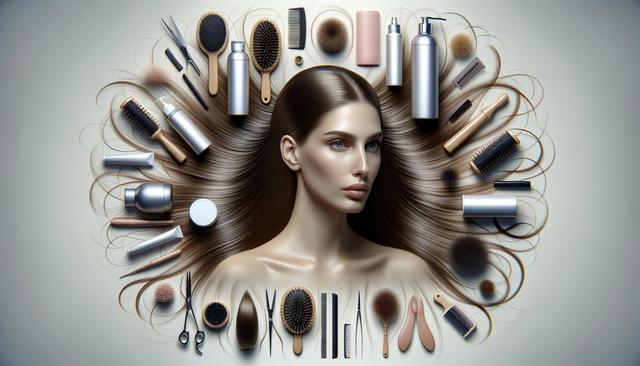The Role of Vitamins in Hair Health
Hair growth and thickness are influenced by a variety of factors, including genetics, hormonal balance, diet, and overall health. Among these, proper nutrition plays a critical role, particularly when it comes to micronutrients. Specific vitamins are essential for the normal development of hair follicles and for maintaining the hair growth cycle. Individuals often seek out vitamins for hair growth and thickness when they notice shedding, brittleness, or slowed growth. These nutrients support the scalp, improve blood circulation, and provide the building blocks for keratin production, which is the protein that makes up hair strands.
Key vitamins associated with hair health include:
- Vitamin A – supports the production of sebum, which moisturizes the scalp
- Vitamin C – aids in collagen production and helps absorb iron, another critical nutrient for hair
- Vitamin D – involved in the creation of new hair follicles
- Vitamin E – offers antioxidant benefits that may reduce oxidative stress on the scalp
- B-vitamins – particularly biotin, are often linked to improved hair strength and shine
Incorporating these nutrients through diet or supplements may help address deficiencies that impact hair vitality.
Common Vitamin Deficiencies That Trigger Hair Loss
When hair loss becomes noticeable, it’s natural to question the root cause. A common concern is: What vitamin deficiency causes hair loss in females? Several nutritional gaps can contribute to hair thinning, especially in women, who may face additional challenges like hormonal changes, pregnancy, and restrictive diets. Iron deficiency, for example, is a leading cause of hair loss in women. However, certain vitamin deficiencies are also frequently linked to shedding and poor hair quality.
Some notable deficiencies include:
- Vitamin D – low levels have been associated with alopecia and general hair thinning
- Biotin (Vitamin B7) – its deficiency can lead to brittle hair and scalp issues
- Vitamin B12 – essential for red blood cell formation, and its shortage can indirectly affect hair follicles
- Zinc – although not a vitamin, its deficiency can also contribute to increased hair shedding
Understanding what vitamins you are lacking if you have hair loss is a crucial step. Blood tests and consultations with healthcare providers can help identify specific deficiencies and guide appropriate supplementation or dietary changes.
Choosing the Right Supplements for Hair Support
With so many products available, identifying the best supplements for hair growth and thickness can be overwhelming. While no supplement can completely reverse hair loss caused by genetics or medical conditions, many formulas are designed to support overall hair health and growth when used consistently. They often combine a range of vitamins, minerals, and sometimes herbal extracts that are known to nourish the scalp and follicles.
Some factors to consider when choosing a supplement include:
- Presence of key vitamins like biotin, Vitamin D, and Vitamin C
- Inclusion of minerals such as zinc and iron
- Third-party testing for purity and dosage accuracy
- Formulation that matches your specific needs (e.g., gender-specific blends)
For example, vitamins for hair loss men may differ slightly in composition compared to those for women, due to differences in hormonal influences and metabolic needs. It’s important to select a product that aligns with your personal health profile and lifestyle.
Gender-Specific Considerations in Hair Nutrition
Hair loss patterns and causes can differ significantly between men and women, which also affects the types of vitamins and supplements that may be most effective. Men are more likely to experience androgenetic alopecia, a hereditary condition influenced by hormones, while women often face hair thinning due to hormonal shifts, stress, and nutritional imbalances. As a result, tailored approaches are often more effective.
Vitamins for hair loss men often include ingredients aimed at supporting testosterone balance and reducing sensitivity to DHT (a byproduct of testosterone that can shrink hair follicles). Common additions may include:
- Saw palmetto (a plant extract believed to block DHT)
- Vitamin B-complex to support cellular energy and reduce stress impact
- Vitamin E and C for antioxidant protection
For women, supplements may focus more on restoring lost nutrients due to menstruation or pregnancy. Iron, folic acid, and Vitamin D are often emphasized. Understanding which vitamins are best for hair loss in your specific case can lead to more effective and personalized results.
How to Include Hair-Healthy Vitamins in Your Routine
Even the most highly rated supplements can only do so much if not incorporated into a balanced lifestyle. Ensuring that your diet includes adequate levels of essential nutrients is a foundational step. Whole foods like leafy greens, nuts, seeds, fish, eggs, and citrus fruits provide many of the vitamins for hair growth and thickness naturally. Supplements should complement—not replace—a nutrient-rich diet.
To effectively integrate hair-supporting vitamins into your routine:
- Take supplements at the same time each day for consistency
- Pair fat-soluble vitamins (like A, D, and E) with meals for better absorption
- Stay hydrated to support nutrient transportation and scalp health
- Avoid excessive supplement intake, which can lead to adverse effects
Combining proper nutrition, stress management, and a supportive hair care regimen can create an environment where your hair is more likely to thrive. Monitoring progress and adjusting your routine as needed ensures that your efforts remain aligned with your hair health goals.
Conclusion: Nourishing Your Hair from Within
Understanding the impact of nutrition on hair growth and thickness is a valuable tool for anyone experiencing hair changes. Whether you’re exploring what vitamin deficiency causes hair loss in females or seeking targeted vitamins for hair loss men, the key lies in a balanced, informed approach. Choosing the right nutrients and incorporating them into your daily life can support your hair from the inside out. While results may take time, consistent care often leads to visible improvement and stronger, healthier hair over the long term.




Leave a Reply